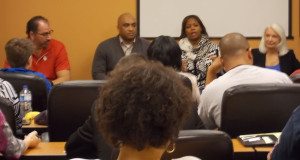Opportunity Inc.

Are you leaving the military? Or maybe you’re already a veteran, but do you need a job?
“It’s not the end of the world. You just need the right information,” Michael Hunter said.
He should know. Hunter is ex-Navy and a career services coordinator at the Opportunity Inc. One-Stop Workforce Center on Glenrock Road, one of 2,500 nonprofits across the country funded by the Department of Labor.
Mark Buehlman, an Army veteran and career developer for Opportunity Inc., told visitors to a Jan. 29 workshop about an array of free services for job-seeking veterans. They range from learning how to write a resume to applying for grants that pay for training or education.
Hunter and Buehlman specialize in assisting veterans. Among other things, they help translate military experience into marketable skills and connect veterans with companies particularly interested in employing them. They organize a workshop called “After TAP,” at the workforce center on the last Friday of every month.
The Transition Assistance Program was once provided by the military. When it was discontinued, Opportunity Inc. began offering an enhanced version of the service for active duty personnel getting ready to retire, activated members of the National Guard and Reserve, military spouses and veterans.
According to Latonya English, deputy director for the organization, what holds most job applicants back is “not being well-informed. It’s the most helpful thing,” she said.
“I’ve been writing my resume the wrong way,” Jason Linscott learned. He appreciated honest answers to his questions and said the experience was very educational.
Linscott left the Navy as a sonar technician in 1998 to get a college education, then re-enlisted as an officer in 2003. Now a Navy pilot, he will retire next month and wants a job as a project manager or operations and maintenance manager.
A panel at the workshop represented companies such as Sentara Healthcare, Newport News Shipbuilding, Sorrentino Mariani and Top Guard Security. They explained why they believe veterans have a lot to offer.
Veterans understand teamwork, they said, and show up every day, on time, focused on the job. They are respectful, good with customers and don’t cause problems.
“Almost anybody E6 and above has done planning and scheduling,” one of the panelists pointed out.
The panel answered questions about security clearances and background checks, resumes versus applications, how criminal records affect hiring, and what getting turned down for being “overqualified” can really mean: Someone else just as qualified can be hired for less.
“Sometimes a veteran will say, ‘I’ve done this, this and this, and I know I’m worth this,’” English said. “Culture shock” sets in when they find out that wages are sometimes lower than expected. Then there is the cost of benefits that were once free.
Advice from the panel: The market should be researched and understood before applying for a job, and “don’t apply for something you can’t live on. The starting salary will not be jumped 10, 15, or 20 thousand dollars when you come in the door.”
Other gems from the panel: “We need to get over ourselves – we can be our biggest obstacle. All that really matters is what the employer wants.”
Here’s an important one: Apply only if you meet the requirements, as in college degrees – though experience can sometimes take the place of a degree if it is preferred rather than required.
“When people enter the military, they go to boot camp. It takes time to learn to be in the military. It also takes time for them to learn to be civilians,” said Nancy Stephens, director of Opportunity Inc.
“We teach them how to sell their value to an employer,” she said.

